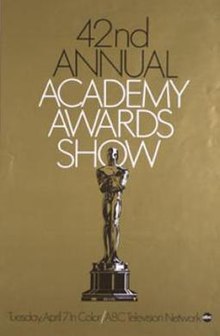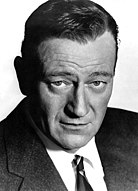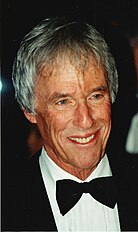42nd Academy Awards
This article needs additional citations for verification. (September 2015) |
| 42nd Academy Awards | |
|---|---|
 | |
| Date | April 7, 1970 |
| Site | Dorothy Chandler Pavilion, Los Angeles |
| Produced by | M. J. Frankovich |
| Directed by | Jack Haley Jr. |
| Highlights | |
| Best Picture | Midnight Cowboy |
| Most awards | Butch Cassidy and the Sundance Kid (4) |
| Most nominations | Anne of the Thousand Days (10) |
| TV in the United States | |
| Network | ABC |
| Duration | 2 hours, 25 minutes |
| Ratings | 43.4% (Nielsen ratings) |
The 42nd Academy Awards were presented April 7, 1970, at the Dorothy Chandler Pavilion in Los Angeles, California. For the second year in a row, there was no official host. Awards were presented by seventeen "Friends of Oscar": Bob Hope, John Wayne, Barbra Streisand, Fred Astaire, Jon Voight, Myrna Loy, Clint Eastwood, Raquel Welch, Candice Bergen, James Earl Jones, Katharine Ross, Cliff Robertson, Ali MacGraw, Barbara McNair, Elliott Gould, Claudia Cardinale, and Elizabeth Taylor. This was the first Academy Awards ceremony to be broadcast via satellite to an international audience, but only outside North America. Mexico and Brazil were the sole countries to broadcast the event live.[1]
This is currently the highest rated of the televised Academy Awards ceremonies, according to Nielsen ratings. Its ratings record remains unbroken as of 2020 thanks to the emergence of the Super Bowl as the biggest event of Awards Season.
Midnight Cowboy became the first – and so far, the only – X-rated film to win the Academy Award for Best Picture. Its rating has since been downgraded to R. The previous year had seen the only G-rated film to win Best Picture, Carol Reed's Oliver!.
They Shoot Horses, Don't They? set an Oscar record by receiving nine nominations without one for Best Picture.
This was the last time until the 68th Academy Awards wherein none of the four winning performances came from Best Picture nominees, as well as the first time where every acting nomination, as well as every major nominated film, was in color.
The ceremony[]
This was the first Academy Award ceremony intended to be broadcast via satellite worldwide, but according to Klaus Lehmann, a foreign sales executive of the ABC television network, in addition to Canada and Mexico (broadcasting the event since 1953, but only live since 1964), only two South American countries, Chile and Brazil, roughly in the Oscars' time zone, were interested in the live coverage. The Chilean television rights to the Oscars were sold by ABC International to Televisión Nacional de Chile while the Brazilian rights were sold to TV Tupi. The latter country's rights to the TV broadcast of the Oscars were moved to a joint venture of TV Bandeirantes and TV Record. Starting in 1974, the Brazilian TV rights to the Oscars were sold by NBC (which had acquired the TV rights to the Awards from ABC to be broadcast for a five-year period until 1975, when they returned to ABC for the next year's Awards) to Rede Globo. An early attempt to change the Academy Awards presentation's start time to 1 p.m. to fit European television audiences was rejected by AMPAS executives. Since at the time television standards conversion was difficult, about 50 other countries did not broadcast the event live. In Europe, most TV broadcasters signed off at midnight, thus the Oscars were not broadcast live and were recorded on film and then shipped to broadcasters with a minimum 4-day delay from the awards' broadcast date.
Winners and nominees[]
Winners are listed first, highlighted in boldface and indicated with a double dagger (![]() ).[2][3]
).[2][3]
| Best Picture | Best Director |
|---|---|
|
|
| Best Actor | Best Actress |
|
|
| Best Supporting Actor | Best Supporting Actress |
|
|
| Best Story and Screenplay Based on Material Not Previously Published or Produced | Best Screenplay Based on Material from Another Medium |
|
|
| Best Documentary Feature | Best Documentary Short Subject |
| |
| Best Live Action Short Subject | Best Short Subject – Cartoons |
|
|
| Best Original Score for a Motion Picture (Not a Musical) | Best Score of a Musical Picture - Original or Adaptation |
|
|
| Best Song Original for the Picture | Best Sound |
|
|
| Best Foreign Language Film | Best Costume Design |
|
|
| Best Art Direction | Best Cinematography |
|
|
| Best Film Editing | Best Special Visual Effects |
|
|
Multiple nominations and awards[]
|
These films had multiple nominations:
|
The following films received multiple awards.
|
Presenters and performers[]
- Fred Astaire (Presenter: Best Supporting Actress and Documentary Awards)
- Candice Bergen (Presenter: Best Sound, Best Costume Design and Best Song Original for the Picture)
- Claudia Cardinale (Presenter: Best Film Editing and Best Foreign Language Film)
- Clint Eastwood (Presenter: Best Foreign Language Film)
- Elliott Gould (Presenter: Best Sound)
- Bob Hope (Presenter: Jean Hersholt Humanitarian Award and Documentary Awards)
- James Earl Jones (Presenter: Best Film Editing and Best Story and Screenplay Based on Factual Material or Material Not Previously Published or Produced)
- Myrna Loy (Presenter: Best Short Subjects, Best Art Direction and Best Director)
- Ali MacGraw (Presenter: Best Story and Screenplay Based on Factual Material or Material Not Previously Published or Produced)
- Barbara McNair (Presenter: Best Original Score for a Motion Picture (Non-Musical))
- Cliff Robertson (Presenter: Best Actress, Best Original Score for a Motion Picture (Not a Musical) & Short Subjects Awards)
- Katharine Ross (Presenter: Best Supporting Actor and Best Screenplay Based on Material from Another Medium)
- Frank Sinatra (Presenter: Honorary Award to Cary Grant)
- Barbra Streisand (Presenter: Best Actor)
- Elizabeth Taylor (Presenter: Best Picture)
- Jon Voight (Presenter: Best Art Direction and Best Screenplay Based on Material from Another Medium)
- John Wayne (Presenter: Best Cinematography)
- Raquel Welch (Presenter: Best Special Visual Effects)
Performers[]
- Glen Campbell ("True Grit" from True Grit)
- Michel Legrand ("What Are You Doing the Rest of Your Life?" from The Happy Ending)
- Lou Rawls ("Jean" from The Prime of Miss Jean Brodie)
- The Sandpipers ("Come Saturday Morning" from The Sterile Cuckoo)
- B. J. Thomas ("Raindrops Keep Fallin' On My Head" from Butch Cassidy and the Sundance Kid)
- Fred Astaire (untitled impromptu dance following presentation of the documentary awards)
See also[]
- List of most watched television broadcasts
- 27th Golden Globe Awards
- 1969 in film
- 12th Grammy Awards
- 21st Primetime Emmy Awards
- 22nd Primetime Emmy Awards
- 23rd British Academy Film Awards
- 24th Tony Awards
References[]
- ^ The Opening of the Academy Awards in 1970 on YouTube At 5:30 mark. Retrieved March 27, 2016.
- ^ "The Official Academy Awards Database". Academy of Motion Picture Arts and Sciences. Select "1969" in the "Award Year(s)" drop-down menu and press "Search".
- ^ "The 42nd Academy Awards (1970) Nominees and Winners". oscars.org. Archived from the original on 2014-12-28. Retrieved 2011-01-11.
- Academy Awards ceremonies
- 1969 film awards
- 1970 in Los Angeles
- Television shows directed by Jack Haley Jr.
- 1970 in American cinema
- April 1970 events in the United States





